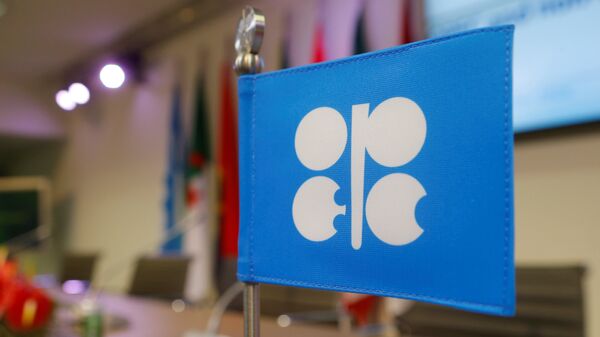VIENNA (Sputnik) — OPEC members are likely to exceed their commitment under OPEC, non-OPEC oil production cut agreement in 2018, which currently stands at 1.2 million barrels per day, Saudi Oil Minister Khalid Falih said Thursday.
All 24 participants of OPEC, non-OPEC oil cut deal agreed at a meeting in Vienna earlier on Thursday to extend the agreement until the end of 2018.
"The decision has been unanimous, it has been solid, which many of you have been urging us to make, which is to roll over and extend the deal to December 2018," Falih said.
“1.2 [million barrels per day] is likely to be exceeded in 2018, as I mentioned some countries are going to produce for their own reasons significantly less,” Falih said at a news conference after the Vienna meeting, referring to Libya and Nigeria, among others.
"Both countries told us and we documented it in the OPEC decision that 2018 levels will not exceed what they were able to achieve in 2017 so to the market there are no surprises to be expected from Libya and Nigeria," the energy minister said.
OPEC said in a declaration that Saudi Arabia will chair the Joint Ministerial Monitoring Committee, established to overview the implementation of the agreement on oil output reduction between the OPEC and non-OPEC states.
"OPEC and the aforementioned non-OPEC producing countries have reached the following commitment… to support the extension of the mandate of the Joint Ministerial Monitoring Committee (JMMC)… chaired by Saudi Arabia, co-chaired by the Russian Federation," the Declaration of Cooperation between OPEC and non-OPEC states said.
Saudi Arabia took over the duty from Kuwait, which previously chaired the JMMC.
Meanwhile, Russian Energy Minister Alexander Novak said that Russian oil companies fully support the extension of the OPEC, Non-OPEC agreement on the reduction of oil production until the end of 2018.
"We are in constant contact with the heads of our companies, which are producers on the Russian market. We constantly discuss the current situation on the market, the balance of supply and demand, and of course, before discussing here, at the ministerial level, we discussed this beforehand and coordinated our positions. This is a common opinion, a common position [to support the deal extension]," Novak said at a news conference following the Vienna meeting.
He added that during the year this situation may change.
"If there is a necessity, the market will be balanced, and, in general, we will not have to continue to keep the same levels. It may be possible to make decisions aimed at gradual changes of these levels," he added.
He said that participants of OPEC, non-OPEC oil cut deal are planning to hold a fresh ministerial meeting in June next year, and that it can be used to adjust the arrangements if the situation demands it.
In 2016, the OPEC countries reached an agreement in Vienna to reduce daily oil production during the first half of 2017 to boost global oil prices. The agreement was also supported by 11 non-OPEC states. In late May, the parties to the accord agreed to extend the deal until the end of March 2018.




